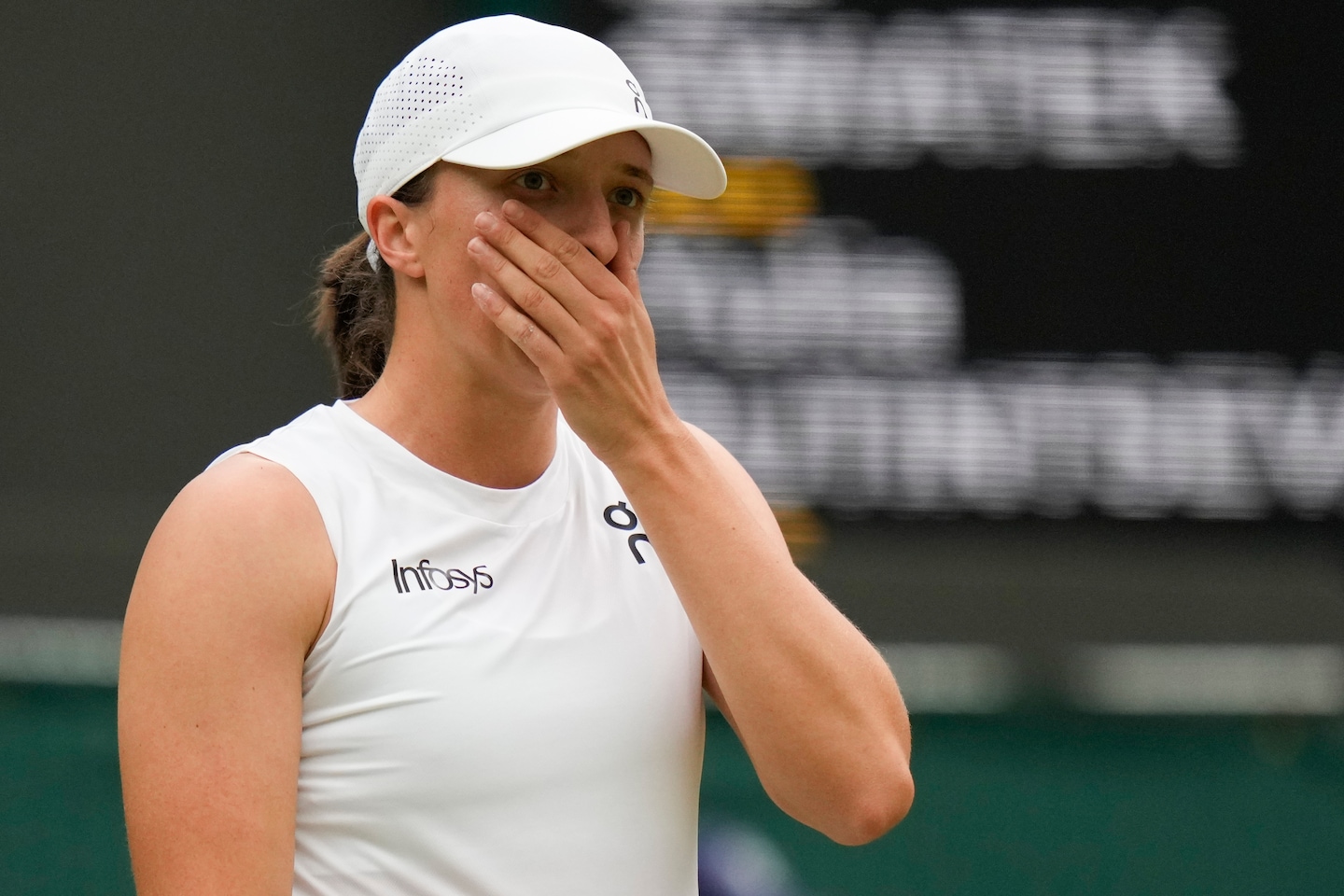But the match that played out under a closed roof on Court No. 1 on Saturday sounded more like fireworks on the Fourth of July than an All England Club duel, so explosive were the shots that came off the racquets of top-seeded Iga Światek and unseeded Yulia Putintseva of Kazakhstan. The crowd smelled the gunpowder and responded in kind, raising the volume to deafening levels and cheering on Putintseva as she became the first woman to beat Światek since April 20.
Poeintseva defeated the top-seeded player 3-6, 6-1, 6-2 in just under two hours, ending Światek’s 21-match winning streak and sending the world number one into the third round of a Grand Slam for the second time this year.
She tossed her racket aside and held her arms up, palms up, as she spun in disbelief as the crowd showered her with applause. It was so loud that the first thing she did during her on-court interview was ask to hear the question again.
“I couldn’t hear you, sorry,” Putintseva said, beaming.
Her victory means that after a rainy Saturday, only three of the top ten ranked women remain: No. 2 Coco Gauff, No. 4 Elena Rybakina and No. 7 Jasmine Paolini.
Tenth-seeded and two-time Wimbledon finalist Ons Jabeur lost to 21st-seeded Elina Svitolina 6-1, 7-6, (7-4) shortly before Putintseva won, and Rybakina secured a ticket to the fourth round by beating wildcard entry and former Grand Slam champion Caroline Wozniacki 6-0, 6-1.
In many ways, Putin’s path to Saturday’s surprise victory was the opposite of her opponent’s.
Swiatek, a five-time Grand Slam champion, was favourite to win her first title here after claiming her fourth French Open title last month, but her race was not expected to be easy.
The 23-year-old is by far the most talented clay court player of her generation and an all-round champion, with 22 titles on all three courts. But success at Wimbledon eluded her; it is the only Grand Slam where she has not advanced beyond the quarterfinals.
This time she stuck to her pattern and avoided all grass tournaments, instead travelling to London early for a shortened training block to get her body used to playing on grass.
Putintseva, on the other hand, entered Saturday’s meeting on a seven-game winning streak on grass after winning a warm-up tournament in Birmingham, England. It was already the longest winning streak of her career before she claimed her eighth victory.
The 29-year-old, who was born in Moscow before deciding to represent Kazakhstan in 2012 — like several players from her native Russia — has enjoyed only a fraction of Swiatek’s success at Grand Slams, having never advanced beyond the second round at Wimbledon.
But she has guts and plays confident tennis. Putintseva had the freedom to be fearless against Swiatek, having never won a set in their four previous meetings.
“I was just [thinking]”I can do it, I have to believe in it 100 percent, I have nothing to lose, just go for it,” Putintseva said. “My coach also told me, whatever shot you do, believe in it 100 percent and just follow.”
So Poeintseva’s courage went hand in hand with Swiatek’s burnout.
Swiatek faded so quickly after a routine first set that she seemed to surprise herself on court. Putintseva was solid and especially punishing with powerful groundstrokes, but she did not so much whip Swiatek around the court as she remained strong despite her opponent’s mistakes.
Swiatek made 14 points of errors as Putintseva took a 4-0 lead in the third set and at times seemed bewildered by her own play, a surprising turn for a player known for her clinical focus. After one particularly bad point, she covered her mouth in disbelief.
“My tank of really pushing myself to the limit suddenly ran out. I was a little bit surprised,” Swiatek said, before giving an immediate analysis. “But I know what I did wrong after Roland Garros. I didn’t really rest properly. I’m not going to make that mistake again.”
Swiatek said her shortcomings were all mental after an intense Roland Garros, where she became the third woman since the start of the Open era in 1968 to win three consecutive French Open titles. She felt she had not recovered properly and said she might take a vacation next year instead of going straight back to work.
“I feel like on grass I need a little bit more energy to be patient and accept mistakes,” Swiatek said. “… For me it’s not easy to go from this kind of tennis, where I felt like I was playing the best tennis of my life, to a different surface where I struggle a little bit more.”
Swiatek can at least take solace in the fact that she will return to red clay for the Paris Olympics before embarking on the North American hardcourt swing. She will also retain her No. 1 ranking after Wimbledon, despite the loss, while Putintseva plays on.
Putinseva will face 2017 Roland Garros champion and 13th-seeded Yelena Ostapenko in the fourth round. It is the first time she has reached that level — and caused such a stir — at the quiet Wimbledon.
